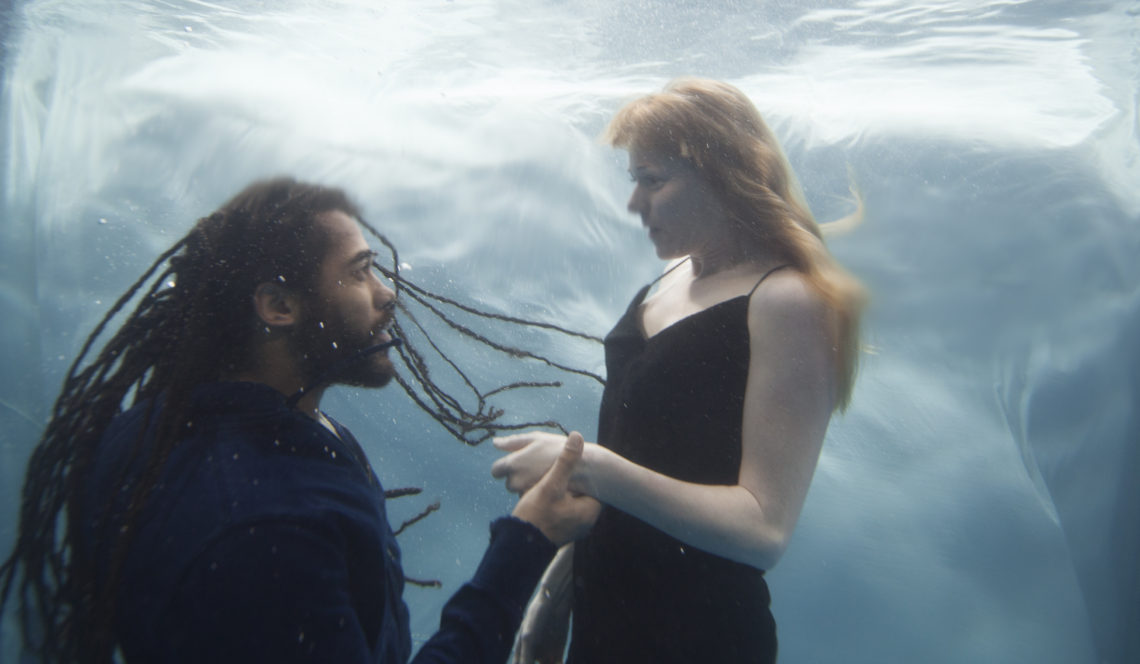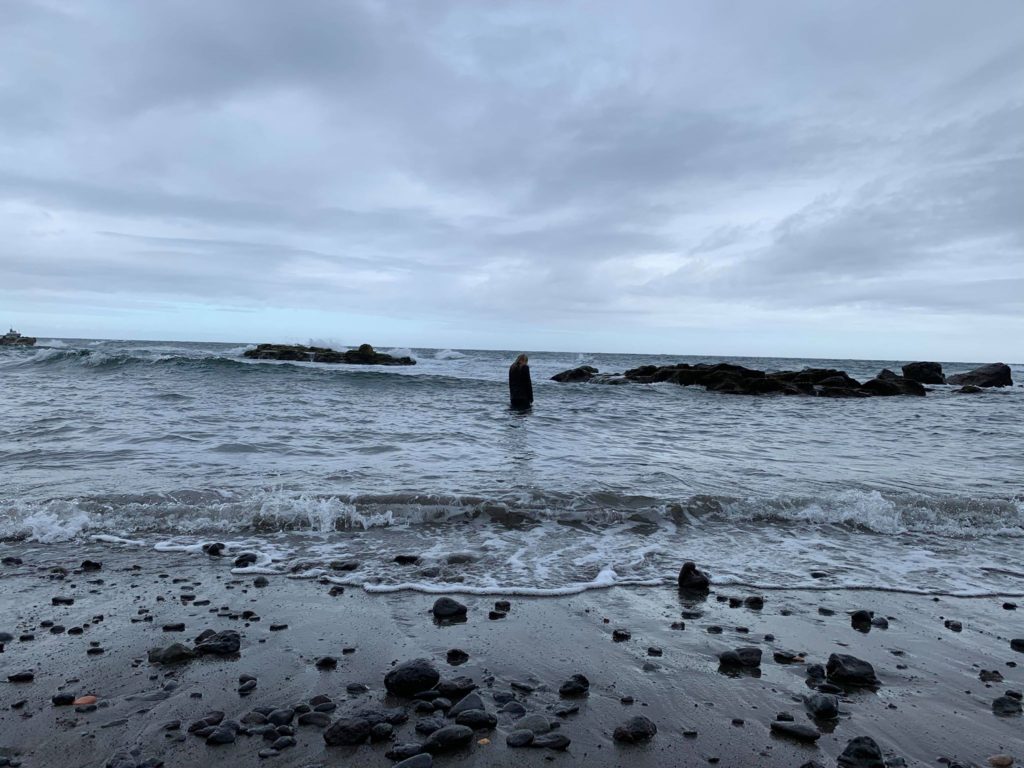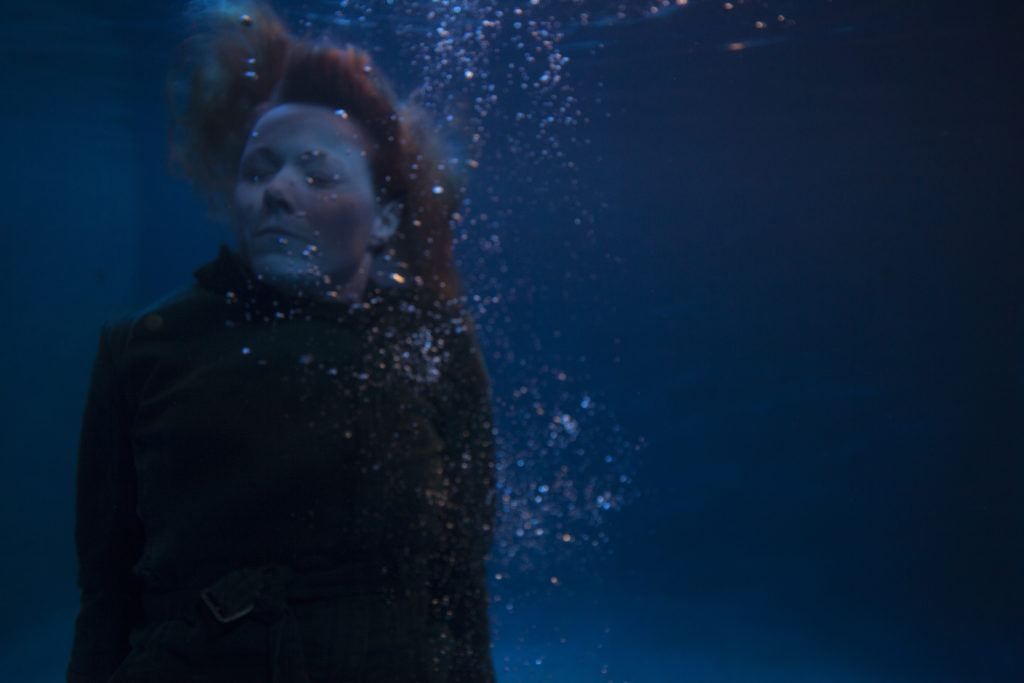
Between Waves Interview: Virginia Abramovich
Is this enlightenment or madness?
Between Waves, the debut feature from writer/director Virginia Abramovich, is an intriguing film that walks a tenuous path between science-fiction and drama.
Exploring mental illness, parallel dimensions and grief, Between Waves opens on Jamie a woman haunted by a lost lover. As she tries to untangle his disappearance and mysterious death, he reappears and pleads with her to join him in a parallel plane.
The tumultuous weather on the island of São Miguel in the Açores deepens the mystery and provides an unfamiliar landscape for a woman already dealing with precarious thoughts.
Between Waves is a thrilling look at the fragility of the mind and the lengths we will go to recover a loved one.
I spoke to Virginia Abramovich about mental illness, working with lead actor Fiona Graham and the path to her first feature.
Between Waves is screening tonight as part of the Canadian Film Fest at 9 p.m. ET/PT (for more information, click here.
Can you tell me about yourself and how you got into filmmaking?
Virginia Abramovich: I got into the industry in my mid-twenties. Theatre with my first love so I majored in theatre at York University but then I wound up doing mass communications and political science. But I also took some film courses and was just like ‘oh this is what I want to do.’
It’s been a very, very long path to directing, I think, maybe, this is a very female path because I had to take off 8 years to give time to my family. I was working in the industry and I got pregnant and my plan was to take a year off and that turned out to be 8 years, which is nuts. I had to leave the industry and I just worked a 9 to 5 job.
I just recently got a survey and they were talking about childcare and I was like ‘Oh my god, this is awesome. This is what the industry needs. Look at studios right now, studio locations have like seven productions going on at a time. Imagine there was child care there and how awesome that would be for people to go and see their children.
It would be revolutionary.
I think it would open up more choices for women to not have to leave the industry to have children. I was very fortunate, I got a chance to come back to the industry, but not everybody has that opportunity.
I learned about the industry from the bottom up working on set. I was a producer’s assistant, an office assistant, slowly building my knowledge of the industry. I kind of tried a little bit of everything. I feel like I did a lot with that but, throughout that whole time, I was making films. I started in 2002 with my first film. I’m very lucky in Canada because we have the Arts Council’s which are very supportive of my work.
I’ve been lucky and I feel very fortunate that I had these agencies to continue learning my craft because I think directing is really about learning and working on set. That’s the only way to get better—from my experience anyway. Over the years I only get better. So it’s been a very, very long journey to making Between Waves.
That’s so interesting that you got to explore different aspects of the industry through those years, did you take anything from those positions that then helped you when you started to direct?
VA: Yeah, to direct you need to understand time because time is very limited onset. You need to understand how to make everything work to your advantage and how to be very diligent with time. But also, you need to make sure that your show balances a budget.
I co-produced this film as well and not understanding how to make a film from the financial and the budget side of it, I don’t think I would ever be able to make it. Now I get hired on films and I’m working together with the producers and with the production manager to make sure that I help. I’m very cognizant of the budget and how creative we can be with it because that’s the push and pull of a project.
I couldn’t have made Between Waves if I didn’t have the production background because no one would be able to make that for me unless I was willing to put in all the work that I did.
Directing is a big privilege, I look at it as a big privilege. You have to really prove yourself and luckily I had enough films by that point that I was able to go into the Canadian Film Centre and do a program. I did my director’s residency in 2013 and then directed some children’s television but also started writing. That was the big game-changer for me. I needed the right kind of script that suited the story I wanted to tell.

I think that’s a good transition into Between Waves. This is a huge story to undertake for your first feature, with Katherine Andrews your co-writer. Where did the story come from and how did you keep track of it all?
VA: I fell in love with the island of São Miguel. My husband’s father’s side is from the island so I’ve gone there a few times. I’ve had this story in my head for like 11 years or something since I went to the island because I found it very healing. I wanted to tell the story about a woman that is struggling with grief and struggling with her own mental illness.
The original idea was going to be a siren that was calling her into the water, which was representing her guilt, but my experience with mental illness was that my father was bipolar and took his life. It’s actually funny cause I’ve only been able to say this after it made the film. A lot of people don’t know this. When watching him struggle, what I found was within his own head it was very real to him.
That’s something I wanted to explore, but not in a deliberate way. I just wanted to take the audience on that journey, have the audience be in that place where you don’t know if it’s real or if it’s imagined.
I had these ideas I wanted to explore but also explore our sense of what’s real and what isn’t. That has always fascinated me because I saw a person struggling with how our reality is constructed. Who’s to say what’s real, that’s another question.
I wanted to explore this not in a typical or overt way and then came the idea of multiverses and us living parallel lives and the idea of choice. A theory with multiverses is that every choice that you make, or every significant choice, you could be creating a different timeline. It also plays into this whole idea of what is reality?
All of this together is what I wanted to explore but I wanted to leave the audience at the end deciding for themselves. I had this question before, and maybe it’s because I watched my father struggle with this, ‘Is he really actually seeing something we don’t see?’ Is it enlightenment or is it madness?
This could definitely be seen as science fiction, obviously, but if you kind of took away that label it could also just very much being drama and that is what is so interesting about this movie, how you dealt with what is real and what isn’t. How did you keep track of all of that while filming?
VA: Everything is very intentional. I always have people ask me, ‘oh did you just film the cows?’ and no, it took so long to organise those cows. Everything was scripted and very intentional although I think because the film has this kind of very raw feel to it that people think otherwise.
We refer to Isaac in three stages. Stage one was their past story, stage two was the Isaac that with coming to her in current times and then there was a third Isaac which is the Isaac that did not pass away, and they remained together and actually took the trip. There are three different realities that she gets a glimpse of. I know it’s nuts. -laughs-
When we were writing we did a lot of cue cards, we would write things out and layout the cue cards on a huge table and move them around and write again. It was a lot of strategic planning.

For me personally, the science fiction I love is more based in reality.
VA: More theoretical right?
Yeah.
VA: It’s more conceptual.
Yeah, stuff that makes you question the world we live in now and I love that you played with the fact that it could be science fiction or could be mental illness. I saw that you worked a lot with your lead actor Fiona Graham, can you speak about this relationship?
VA: Fiona and I met at a film festival in Huston, in the good old days when you could go to festivals, when I saw the film she was in. We wound up hanging out together and basically her and I have been talking about doing a project together for a long, long time.
There is also this thing where she’s over 40, I’m over 40, and coming back to the film industry when your not young there’s some ageism for sure. People discredit your ideas because you’re older. On the opposite end, I think like I’ve come into this with all this experience and a lot of thought. I’ve matured a lot, and I’ve got so much more to offer and for actors, but there are very few roles written for older women.
So first we created this character, Jamie, and I went down to New York and we just spent days working out what this character was and what her backstory was. Things changed and evolved but when we started to write the story we had a character who the story was centred around. As we were writing drafts, we would get to a point where we were happy and I would share that with Fiona.
But then there’s another thing that we did, which again I feel very fortunate to do, we went to New York with Katherine and workshopped with Fiona scenes from the script but also other moments that were not in the script but added to the story and the character. By the time we went to shoot, nobody had to question who Jamie was.
It’s so rare to see an actor be with a project for that long and actually get to portray the character in the end.
VA: We were lucky. If this project had money, I wouldn’t be able to afford to do that but we were just artistically collaborating. It was a joy to work like that.
It’s like the director Mike Leigh, he doesn’t even have scripts. He just works on character development with actors for 6 months at a time. It’s very cool, I would love to be a fly on the wall or just watch him work. This wasn’t even close to being as intense as the stuff that he does but it was a really awesome experience to be able to do that.
That kind of sounds like, going back to your beginnings, what they do in theatre. They just explore characters, rehearse so much and then bring the show to life.
VA: I didn’t think about that you’re right, it all connects back to theatre.
What are you working on next?
VA: I am going into an edit in two weeks on a romantic comedy that I was hired to direct. I’ve been very fortunate I’ve been hired on a number of romantic comedies since I’ve made Between Waves. Then Katherine and I are working on another feature, a sci-fi called Lil, which I hope will get more funding.
Because I have been in the industry so long, it was really the incredible generosity of the film industry and some of the professionals that came out to help me make this. Really awesome people that just came together for the spirit of creating, it’s really amazing when that happens.

